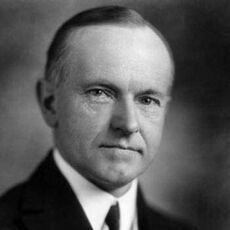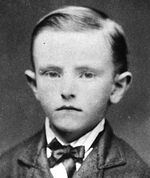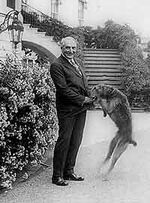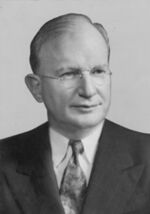Calvin Coolidge
| Calvin Coolidge | |
|---|---|
 | |
| Born | July 4th, 1872 Plymouth Notch, Vermont |
| Died | Disputed; possibly January 5th, 1933 Massachusetts, or nowhere |
| Nationality | American, if puppets have nationalities |
| Education | Amherst College |
| Occupation | 30th President of the United States |
| Term | August 2nd, 1923 - March 4th, 1929, or present |
| Predecessor | Warren G. Harding |
| Successor | Herbert Hoover |
| Political party | Republican |
| Religion | Christianity? |
| Spouse | Grace Goodhue "First Lady" Coolidge |
| Children | John, Calvin Jr., Charlie McCarthy |
“...............”
“He's dead? How can you tell?”
John Calvin Coolidge Jr. (July 4, 1872 - January 5, 1933, or present) was an American statesman and ventriloquist dummy that served as the 30th President of the United States from the death of his predecessor Warren G. "Party Hard"ing on August 2, 1923, until the inauguration of his poorly-chosen successor Herbert Hoover on March 4, 1929. Previously, he had been Vice President under Harding and the 38th Governor of Massachusetts, as well as a runner-up on America's Got Talent.
Coolidge was the only dummy (in the puppet sense) ever to serve as president. Being a dummy, he was incapable of speech, a trait which endeared him to the American people in an age when entertainment consisted of day-long lectures on the supposed evils of alcohol and politics consisted almost exclusively of bloated Senators arguing about tariffs for several years. This quietness earned him the popular nickname "Silent Cal", though few Americans realized the source of his silence was his being an inanimate object; throughout his career Coolidge was always accompanied by his wife, Grace, who actually carried out the work he supposedly did and gave him the occasional appearance of life through ventriloquism. Despite (or perhaps because of) him not having done anything, Coolidge is now widely remembered as one of the greatest presidents in American history.
Early Life[edit]
Calvin Coolidge was born, or rather made, by Calvin Coolidge Senior in the town of Plymouth Notch, Vermont. Coolidge Senior was a bit of a Renaissance man and worked variously as a farmer, justice of the peace, tax collector, bartender, doctor, bullfighter, stand-up comedian, tarot card reader, and was even a member of the illustrious Vermont state legislature. Whittling and puppetry were hobbies passed down from his father, and in his minimal spare time he steadily grew more advanced and eventually began work on his most intricate work ever: a ventriloquist dummy. By chance he completed it on the Fourth of July and, in celebration, dubbed it Calvin Coolidge Junior, presenting it to his wife as their first son.
Victoria Coolidge objected to their new "son" on the grounds that they were perfectly capable of having an actual human child. By this point Coolidge Sr. had already become sentimentally attached to his little boy, but compromised by reluctantly agreeing to have sex and produce a real child. Calvin Jr.'s sister Abigail was born shortly thereafter.
Coolidge had a somewhat troubled "childhood"; though his "father" was kind, working him into his stand-up routines to great effect, he suffered loss. When he was twelve (or rather, twelve years after his creation), his "mother" died of tuberculosis, followed before long by his "sister" with "appendicitis". Being a "dummy", Coolidge was "immune" to such "ailments", but his father had him vaccinated anyway.
Left rather lonely, Coolidge Sr. became way too invested in his son and enrolled him in several schools by using his great natural talent for ventriloquism (and bribery) to convince school officials Calvin Jr. was alive. Calvin Sr. also got himself allowed into classes as an observer, which is to say he did all Calvin Jr.'s work and was there on the very rare occasions when it was necessary for him to speak. He graduated from Amherst College with flying colors and a degree in Polish, making him the fourth person in America to speak the language. The degree was doubly useless since at the time, as a country, Poland did not exist. Coolidge later described it as a "nonsense language" and that it was "made as a practical joke", which is really saying something considering he quite literally had no sense of humor.
Seeing his son's brightness, Coolidge Sr. decided his son should become an attorney. Standard practice at the time was to, instead of going to law school, just kind of hang out around lawyers until you absorbed enough knowledge to pass the test to become one. After finding lawyers willing to be stalked by a 52-year-old man and his giant puppet-child, Coolidge duly studied and was successfully admitted to the bar in 1897.
At his father's urging, Calvin Jr. moved out to start his own law firm, which he did with the moderate success and excruciating dullness typical of emotionless husks his age. After several years, Coolidge was found by Grace Anna Goodhue. Grace, a few bills short of a statute, had been seeking him to sue the state of Massachusetts for outlawing murder in violation of her First Amendment right to freedom of expression. When she found Coolidge, she was immediately enamored with his simplicity, contrasting as it did with the 500-page dissertations Victorian courtship practices required of other men.
Over the strong objections of Grace's mother, who did not approve of her daughter dating a dummy in a suit, the two were married, and before long little John Coolidge was born. A second son was named Calvin Coolidge Jr. despite the fact Coolidge was himself a Junior, making the child technically Calvin Coolidge Jr. Jr. and himself Calvin Coolidge Jr. Sr; evidently Grace loved his name as well.
Early political career[edit]
Despite her "quirks" Grace Coolidge possessed a keen political instinct, and moreover, realized the opportunities her marriage afforded her; with her husband a literal puppet, she could use him to acquire power and influence that she, as a woman, could never herself possess. Coolidge had his political start in a number of totally irrelevant local offices such as "Delegate to the City Council of Northampton" and "Adams County Mailbox Commission Board President", after which he followed his father's footsteps into Massachusetts' state House of Representatives.
Throughout his life Coolidge was a registered member of the Republican Party. At the time, the Republican Party was led by the progressive Theodore "Fuck Shit Up" Roosevelt. The Democratic Party was divided between a southern branch centered on good old-fashioned racism, and a Northern faction led by William Jennings Bryan, whose uniquely self-righteous form of bland 19th-century populism can be best summarized by the fact that his famous Cross of Gold speech - which ended "you shall not put down upon the brow of labor this crown of thorns, you shall not crucify mankind upon a cross of gold" - was given in opposition to the Sherman Silver Purchase Act of 1873.
Even for Coolidge, whose mind was occupied in idle moments by the contemporary equivalent of VHS static, this was too much, so a Republican he was. It also helped that at the time it was illegal to be a Democrat in the North, as was being a Republican in the South. After doing all the momentous work required of a Massachusetts state representative, Coolidge decided to relax and run for Mayor of Northampton. After that, he successfully ran for the State Senate several times, after which he had enough stamps on his state-issued Political Experience Ticket for a free drink at Starbucks. It also got him the nomination for Lieutenant Governor, a position which took all the overshadowed powerlessness of the Vice Presidency and demoted it to the state level.
In 1915 Coolidge was elected as the running mate of the infamous Samuel "Sam McCall" McCall. To ensure minimum efficiency, the Governor of Massachusetts served a one-year term, which meant that he was perpetually running for reelection. Though the endless electioneering was exhausting, being governor also kept McCall from being drafted into World War I, and at 65 McCall was less than optimistic about his odds against two million Germans. When the war ended, McCall tapped out and declined to run for reelection. It was Coolidge's time to shine.
Coolidge's Democratic opponent in the gubernatorial race in 1918 was some guy named Richard H. Long. By this point, some people had begun to notice that Coolidge had spoken a total of 23 words in public since 1907. Some others also noted that when he spoke, his voice was unusually high and remarkably similar to that of his wife, who he never appeared without. Of course, had anyone suggested the Coolidge was a ventriloquist dummy being controlled by his wife, they would have been publicly mocked and given a nice dose of electroshock therapy, which was the standard treatment for mental illness at the time. Aside from this, Coolidge was a remarkably popular politician, and his opponent was handicapped by the aforementioned ban on being a Democrat in the north, forcing him to run Debs-style. Coolidge won by 16,773 votes, which according to Wikipedia was the closest of his statewide elections.
The first and apparently only issue Coolidge faced as governor was a strike by the Boston Police Department after being forbidden from joining a union. This provoked a crisis that grew beyond the city to national attention, since at the time the Red Scare was in full swing and anything resembling disorder or disagreement with the government was liable to have you branded a communist and shot into space. Coolidge not unreasonably told the policemen that, being the police, they kind of can't strike, a point underscored by widespread looting and murder. When they continued, Coolidge pulled a Reagan and somehow become a hero by firing everyone. Under such circumstances, he defeated Richard Long again for reelection by a slightly larger margin of 125,101 votes, consigning Long's historical reputation to the oblivion of this article.
1920 was a presidential election year, and Coolidge was chosen by Republican party bosses as a delegate to the national convention. Since having opinions got you opposition from somebody or other, party leaders were unable to agree on anyone well-known and nominated Senator Warren G. Harding of Ohio for president. Not caring about the Vice Presidency, the bosses let everyone know their choice was some guy named Irvine Lenroot and took a smoke break. A delegate who had read one of Coolidge's speeches took the opportunity to nominate him instead, and he was promptly nominated, much to the annoyance of the party bosses. Grace at this point was in way over her head, but it would be fine so long as he never actually became president.
Coolidge campaigned for Harding with a number of totally unremarkable speeches to groups hand-picked for their willingness to hear a speech twelve seconds long. His Democratic opponents were a newspaper publisher from Ohio, James M. Cox, and some loser named Franklin Delano Roosevelt. Harding's campaign strategy was to completely ignore Cox and instead complain vaguely about the League of Nations and "normalcy", which nobody informed him was not a word. Coolidge's eloquence (along with having a lot more money) led to a landslide, winning the popular vote 60% to 34% and the electoral college 404 to 127, which is an even sadder margin than it sounds. As usual, the Democrats only carried the South, minus a defection from that most dastardly of states, Tennessee.
The election took place on November 2nd, which coincidentally was Harding's 55th birthday, and it also helped that much of the American electorate would've felt bad about smashing a man's dreams on his birthday like some sort of mega-asshole.
Vice Presidency[edit]
Vice President of the United States has always been a position utterly devoid of actual influence, with many prominent statesmen taking recommendation to the office as an insult. The unfortunate souls finding themselves stuck with the job have always had to content themselves with sitting in the Senate looking important and dreaming of ways to assassinate the president - that is, if they had any sense of ambition. Others such as Millard Fillmore were actually quite content with being paid by the government to do nothing, and in fact were so used to doing nothing that when they became president they continued to do nothing.
Grace Coolidge belonged to the former group, her lust for power more than matching her disdain for spider monkeys and modern art. Though crazy enough to either love a puppet or think he was alive, she was not stupid and recognized that being the president would bring a bit too much attention to the impossibly elaborate ventriloquist act that was Coolidge's political career. She also harbored some doubts about her ability to carry out the duties of the job, but being crazy, she disregarded all this and began planning to murder Harding. During this time, from 1921 - 1923, she left Coolidge in his chair in the Senate, where he fit right in with the geezers who hadn't left the chamber since the Civil War.
Warren Gamaliel Harding was, in the opinion of most modern historians, a shitty president. He himself admitted that he had no idea was he was doing and seemed incapable of grasping the fact that he was the President of the United States, spending most of his time playing poker or having poorly-concealed affairs while his hand-picked cabinet of trusted friends did the real work of abusing their jobs with all the subtlety of Adolf Hitler and all the finesse of a bear with chainsaws for hands.
Despite this, Harding was enormously popular with the American people. It was the Roaring 20s, and unlike the 2020s, they were so called because they were grand and exciting and not because everyone was screaming into the void in the vain, desperate hope that God would answer. America was victorious, powerful, and at peace, and the economy was booming. America was the world's largest creditor, loaning out massive sums to Germany to pay war debts to Britain and France to pay for their own war debts to the United States, a brilliant circular system that worked perfectly so long as the German government remained stable. The fact that the German government had been teetering on the edge of the abyss since the end of the war went unnoticed since nobody cared about Germany anymore.
In 1922 Harding's Secretary of the Interior, Albert Bacon Fall, accepted bribes from the oil industry in exchange for cheap access to Navy reserves of petroleum out in the middle of nowhere. Back in the 1870s this would have been seen as just some harmless corruption, but by the 1920s progressive liberal crybabies were branding such behavior "criminal" and "treasonous". Harding, realizing the lid was about to blow on the whole thing, strategically had a heart attack and died on August 2nd, 1923, ruining Grace's still-developing plans to lure him into a Rube Goldberg-esque deathtrap during New Years' celebrations in 1928. The coup de grace was going to be a pie to the face with a hand grenade hidden in it, so she was immensely disappointed, but on the bright side, she wouldn't have to dig up St. Patrick.
Early Presidency[edit]
Upon learning of Harding's death, Grace stopped by the Capitol to grab Coolidge and went to the house of his dad, who was still alive and a justice of the peace. Early the next morning Coolidge was sworn in by his father as the 30th President of the United States, after which he took a nap. If his father had any thoughts about his puppet-child being president, they are not recorded. The country was initially unsure of what to make of Coolidge, since he had been forgotten completely after the election. His first test was dealing with the oil scandal, known as the Teapot Dome affair on account of Albert Fall's dome being as thin and empty as a teapot. The whole scandal came to light the second Harding kicked the bucket, and Coolidge's characteristic response was to do nothing and let the Senate investigation run its course. Fall and his other cronies obligingly resigned, and Coolidge's prestige soared.
In a speech to Congress, Coolidge laid out an extremely bland platform basically identical to Harding's; conservative budgeting, limits on immigration, an international treaty placing limits on naval tonnage, income tax reduction, standardization of bolt measurements in car production, and in one of Grace's less stable moments, enforced women's suffrage with a $500 million penalty for not voting. He for some reason vetoed a bill granting bonuses to World War I veterans and did something or other to grant all Native Americans citizenship, which he felt was abundant compensation for that whole land-stealing-smallpox-Trail-of-Tears-thing.
In 1924 Coolidge was up to run for reelection. The powers of incumbency, plus a liberal helping of bribery and death threats from Grace, helped ensure his renomination at the Republican National Convention. The Democratic Party, after a contentious convention and 103 ballots, agreed upon one John W. Davis, the former American ambassador to Britain, a nominee who like in 1920 was agreeable because he inspired absolutely no feeling whatsoever.
Though she was fiercely determined to win, Grace decided to play to Coolidge's strengths by not doing or saying anything. Instead, he stole the idea for a slogan from a White House staffer - "Keep Cool with Coolidge" - and sat back to let it work its magic, trusting it to win over any voters not content with the default platform of reduced government, reduced taxes, opposition to Prohibition, and free ponies for all. Davis conducted a normal campaign of the time, but was hampered both by his ridiculous obscurity and the fact that his platform was a word-for-word plagiarism of the Republican one. With the Democrats effectively folding, the progressive banner was taken up by Senator Robert La Follette of Wisconsin, who attracted many voters with his extravagant pledges to actually do things if elected.
Unfortunately for La Follette, doing things had been out of fashion since Teddy Roosevelt went into hibernation in 1919, so he only won his home state of Wisconsin. Since Coolidge and Davis were identical in both their politics and their complete lack of a personality, the rest of the country split right down the middle, tying the electoral college 259 - 259. Normally this would have sent the election to the House of Representatives, but Coolidge simply couldn't believe the people were that uncertain about his leadership. Accordingly, he sent Grace to conduct "recounts" with the helping hands of the National Guard, the FBI, and some others.
Grace's recounts found that the Democrats had bused millions of illegal voters into key swing states such as North Dakota and Wyoming. Subtracting these votes changed the results such that Coolidge emerged with a comfortable victory in both the electoral and popular votes, consigning John W. Davis' historical legacy to the oblivion of this article.
The rest of his presidency[edit]
Having received the people's mandate on his own merits, Coolidge set about the hard work and leadership they elected him to do. At the time the legislative process was well-established and predictable; about once a month the president would submit a modest bill on a mundane topic to Congress. The Speaker of the House would allow one person from his own party to lecture everyone else on why the bill was either a crucial foundation of democracy or a pact with Satan, after which it would be passed by the House. The bill would then go to the Senate, where bloated Republican senators from Ohio named Charles Blaine mangled it thoroughly, filibustered it for a few days, and delivered to the president a completely different bill reducing the tariff on wool imports from England by 1.8%. The president would then veto this bill as unconstitutional for some reason or other, and the cycle would restart.
Grace was shrewd enough to know she had to mostly play by the rules, but her philosophy was that there was no point being President of the United States if you couldn't have a little fun with it. Accordingly, every now and then she had Coolidge throw Congress a curve-ball.
Her proposed legislation included:
- Free ponies for all
- Ending Prohibition
- Desegregating the military
- Building a new capital in Alaska named "Thot World"
- Making all criticism of the president a capital offense
- Replacing the Senate with a Romanian fortune-teller named Griselda
- Sending an expeditionary force to Antarctica to search for the Holy Grail
- Making Coolidge Eternal President
- Allowing the president to appoint and remove Supreme Court Justices at will
- Creating a nobility, and changing the Vice President's title to "Lord Bitchface"
- Outlawing war
Amazingly, Congress actually passed four of these laws, including the one about ponies. One of the others was criticizing the government, which was easy since good ol' Woodrow Wilson's Sedition Act of 1918 was technically still on the books. They also made Coolidge Eternal President, which is distinct from President for Life in that Coolidge is still the president. The last one was outlawing war, which was accomplished when in 1928 when Coolidge's Secretary of State, Frank "Frosted Flakes" Kellogg, met with his French counterpart Aristide "Frog-Face" Briand and signed a pact renouncing war "as an instrument of national policy". A host of other nations joined in when their diplomats couldn't resist the fanciness of the pen used for the signing, including Germany, thus ensuring world peace until the end of time.







